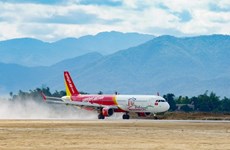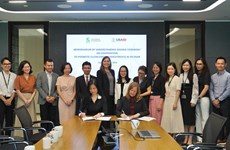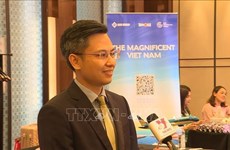VN calls for cooperation in sustainability
Asian countries needed to speeding up regional cooperation in international integration.
Countries in the Asian region needed to join hands in mitigating the
effects of climate change, pursuing a green economy model as well as
speeding up regional cooperation in international integration, to help
the region’s socio-economy to achieve sustainable development.
The statement made by the governor of the State Bank of Vietnam, Nguyen Van Giau at the Bank Governors’ Seminar in the framework of the ADB (Asian Development Bank) 44th Annual Meeting in Hanoi.
During the seminar, Giau underlined ADB’s important role in realising initiatives to successfully solving the issues which could affect the Asian region’s future socio-economic development.
He also highlighted the significance of coordination between governments and the public in pursuing a green economy model, which was an environmentally friendly model.
On the Asian region’s open trade, Giau expressed his support for the diversified model of international integration to mitigate negative impacts of the globalisation process, saying that regional cooperation was a priority.
According to ADB’s research results, among Asia’s fast-growing economies, Vietnam , a country with the two-way trade reaching 150 percent of GDP in 2010, has enjoyed many benefits from the Asian region’s momentum and development prospects. ADB affirmed the policy choices and directions of the Vietnamese government in effectively integrating into the regional and global economy.
“Along with the potential and innovations, the correct policies and development directions, I believe that the Asian economy could maintain a fast and sustainable development speed and become a thriving economy of the world by 2050,” Giau said.
At the seminar, the participants also discussed a draft report titled, “Asia 2050 – Realising the Asian Century”, affirming that Asia could become a prosperous region by the middle of the century.
The report identified six key drivers of transformation in the region: technical progress, capital accumulation, demographics and the labour force, the emerging middle class, climate change mitigation and the competition for resources, and the communications revolution./.
The statement made by the governor of the State Bank of Vietnam, Nguyen Van Giau at the Bank Governors’ Seminar in the framework of the ADB (Asian Development Bank) 44th Annual Meeting in Hanoi.
During the seminar, Giau underlined ADB’s important role in realising initiatives to successfully solving the issues which could affect the Asian region’s future socio-economic development.
He also highlighted the significance of coordination between governments and the public in pursuing a green economy model, which was an environmentally friendly model.
On the Asian region’s open trade, Giau expressed his support for the diversified model of international integration to mitigate negative impacts of the globalisation process, saying that regional cooperation was a priority.
According to ADB’s research results, among Asia’s fast-growing economies, Vietnam , a country with the two-way trade reaching 150 percent of GDP in 2010, has enjoyed many benefits from the Asian region’s momentum and development prospects. ADB affirmed the policy choices and directions of the Vietnamese government in effectively integrating into the regional and global economy.
“Along with the potential and innovations, the correct policies and development directions, I believe that the Asian economy could maintain a fast and sustainable development speed and become a thriving economy of the world by 2050,” Giau said.
At the seminar, the participants also discussed a draft report titled, “Asia 2050 – Realising the Asian Century”, affirming that Asia could become a prosperous region by the middle of the century.
The report identified six key drivers of transformation in the region: technical progress, capital accumulation, demographics and the labour force, the emerging middle class, climate change mitigation and the competition for resources, and the communications revolution./.













